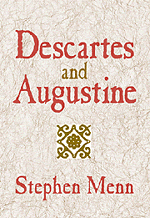8 - From God to bodies
Published online by Cambridge University Press: 04 August 2010
Summary
The creation of the eternal truths
Descartes has argued that we can establish a science of bodies only if we first secure an independent knowledge of the soul, and establish a criterion of its cognitive faculties; and he has argued that we can establish such a criterion only through knowing God as Nous. This knowledge of soul and God may be a necessary condition for science; but is it also sufficient? Descartes, like Plotinus and Augustine, conceives God as the source of knowledge to the soul; like Plotinus and Augustine, he uses this conception to lead us up to God; but unlike Plotinus and Augustine, he is equally interested in leading us back down. The fourth Meditation already is looking for “a way … from the contemplation of the true God … to the knowledge of other things” (AT VII, 53), without specifying which “other things” these are; the fifth and sixth Meditations turn specifically to derive knowledge of the essence and existence of bodies, and Part Two of the Principles claims to derive the “principles of material things” from the metaphysical principles of Part One. In the present chapter, without discussing Descartes' physics in detail, I will describe Descartes' strategy for arguing from metaphysics to physics, to the extent that this affects the meaning of his metaphysics and of his philosophical project as a whole.
- Type
- Chapter
- Information
- Descartes and Augustine , pp. 337 - 392Publisher: Cambridge University PressPrint publication year: 1998

